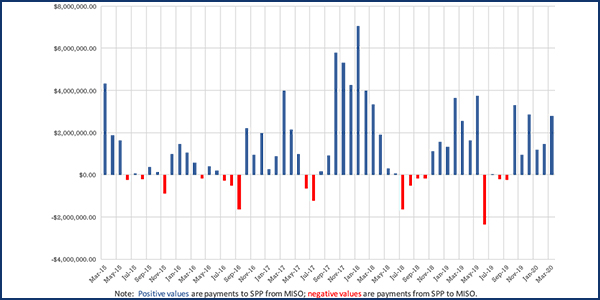SPP’s Market Monitoring Unit last week released the final version of its 2019 State of the Market report and a study conducted for state regulators working on improving issues across the MISO seam.
The MMU shared a draft of the market report in April with the Board of Directors. (See “Lowest Prices Ever for Integrated Marketplace,” SPP Board/Members Committee Briefs: April 28, 2020.)
The Monitor said SPP’s energy prices were the lowest since its Integrated Marketplace went live in 2014. Day-ahead prices averaged about $22/MWh and real-time prices about $21/MWh, both down from $25/MWh in 2018.
The report also lists several new market-improvement recommendations, including strengthening price formation during emergencies and scarcity events, incentivizing capacity performance, and updating and improving outage coordination methodology.
The MMU will discuss the report with stakeholders during a May 26 webinar.
The second report analyzes coordinated transaction scheduling (CTS) as part of the MMU’s work for the SPP Regional State Committee and the Organization of MISO States’ Liaison Committee.
The study estimated that the RTOs are incurring $9.4 million to $11.2 million in economic inefficiency losses because they lack a CTS product. The MMU looked at cost and benefit information from other markets’ CTS products and estimated the potential increase in flow across the SPP and MISO seam.
The MMU said several roadblocks are hampering efficiency gains, such as transmission fees and non-energy market charges for CTS transactions, ramp-rate restriction on net scheduled interchange, and price forecasting accuracy, volatility and uncertainty.
Potomac Economics, MISO’s Independent Market Monitor, has also filed a study report with the regulatory committee that evaluates the market-to-market (M2M) coordination processes. The M2M process allows the RTOs to manage together congestion on transmission constraints that affect both SPP and MISO.
The IMM study says that “even modest improvements” in the M2M process can lead to large changes in congestion costs and efficiency savings. The RTOs’ congestion costs during the one-year study period exceeded $150 million.
WEIS Market Participants Prep for Tests
David Kelley, SPP’s director of seams and market design, told participants in the RTO’s nascent Western Energy Imbalance Service (WEIS) market to “buckle up” with market trials just weeks away.
“Ensure your systems are working,” Kelley told members of the Western Markets Executive Committee during a webinar Friday. “You will start to get flooded with a lot of information around market trials. It’s about to be a wild ride.”
In July, WEIS market participants will conduct connectivity testing to ensure their systems can “talk” with SPP’s. Structured and unstructured testing will be held from August through Nov. 20.
The WEIS market, with eight participants signed up, is scheduled to go live in February 2021. Kelley said the implementation project is in yellow status only while it waits on a second release of its markets software.
SPP, MISO Begin Year 5 of M2M Process
SPP and MISO began their fifth year of M2M operations across their seam by continuing the trend set during the first four years, with SPP again benefiting from settlements in its favor.
The RTO piled up $2.77 million in M2M settlements in March, raising its 61-month total to $76.35 million, staff told the Seams Steering Committee on Wednesday. M2M settlements have accrued to SPP for 45 months since the two RTOs began the process in March 2015.
Temporary and permanent flowgates on the RTOs’ seam were binding for 681 hours during March. Temporary flowgates accounted for 429 of the binding hours.






